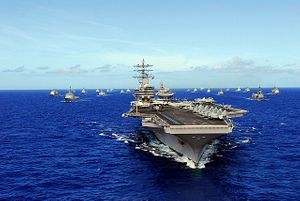Last Friday, the United States released its updated Cooperative Strategy for 21st Century Seapower (CS-21). One of the biggest critiques of the first Cooperative Strategy concentrated on the difficulty of fitting China and Russia into the “cooperative” frame. China continues to expand its navy and has obviously undertaken a set of assertive actions in the East and South China Seas. Russia has, in recent years, invaded Georgia and Ukraine, effectively annexing parts of both countries. How does it make sense to include either of these countries under the tab “cooperation?”
The Cooperative Strategy is effectively a strategy for defending the liberal international economic order. The 2015 version (and its 2007 predecessor) is at its best when it envisions the operational employment of the U.S. maritime services in pursuit of basic oceanic maintenance. Most notably, this includes fighting against people best characterized as “enemies of all mankind” (including pirates, thieves, and terrorists), and dealing with humanitarian disasters.
The document is less effective at characterizing great power conflict in the maritime space. Even when two countries both allow the possibility of positive sum cooperation at sea, conflict can arise over the precise distribution of spoils, as well as concerns over vulnerability. And some countries do not place a high value on the reliability of maritime security.
Russia and China pose the greatest potential threats to the vision of liberal international order implicit in CS-21, a situation that has more or less held since 1949. Yet China is, for the first time in its history, deeply dependent on the sea. And there’s every indication that the Chinese fully understand this. The PLAN is not the Red Banner Northern Fleet, a force intended primarily for the protection of SSBN patrol areas and for the disruption of NATO control of the North Atlantic. The PLAN will, in the fullness of time, become a blue water navy, fully capable of protecting Chinese trade and projecting Chinese influence across Asia and beyond.
Russia is different. While we should generally view geographically determinist accounts with skepticism, there is no question that the maritime sphere is far less important to Russia than it is to the United States or China. Russia benefits less from a reliable set of interlocking regimes and procedures for managing the maritime sphere, and can take advantage of asymmetric opportunities to disrupt that system.
In short, Russia has the luxury of playing the spoiler, because Moscow understands that everyone else needs the sea more than Russia does. Beijing, on the other hand, needs the system of order that the United States has constructed in the maritime sphere. While China may fight hard to ensure it gets an appropriate seat, it’s far less likely than Russia to try to upend the table.

































